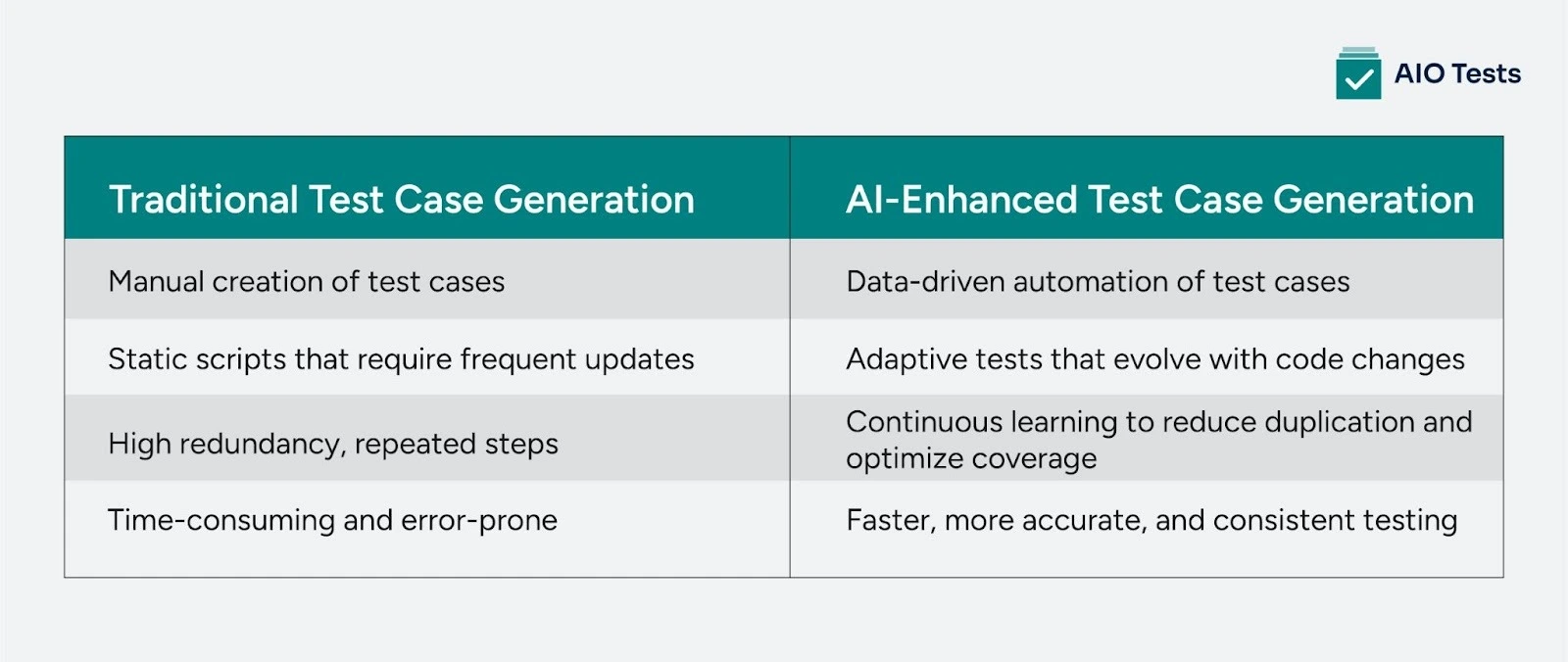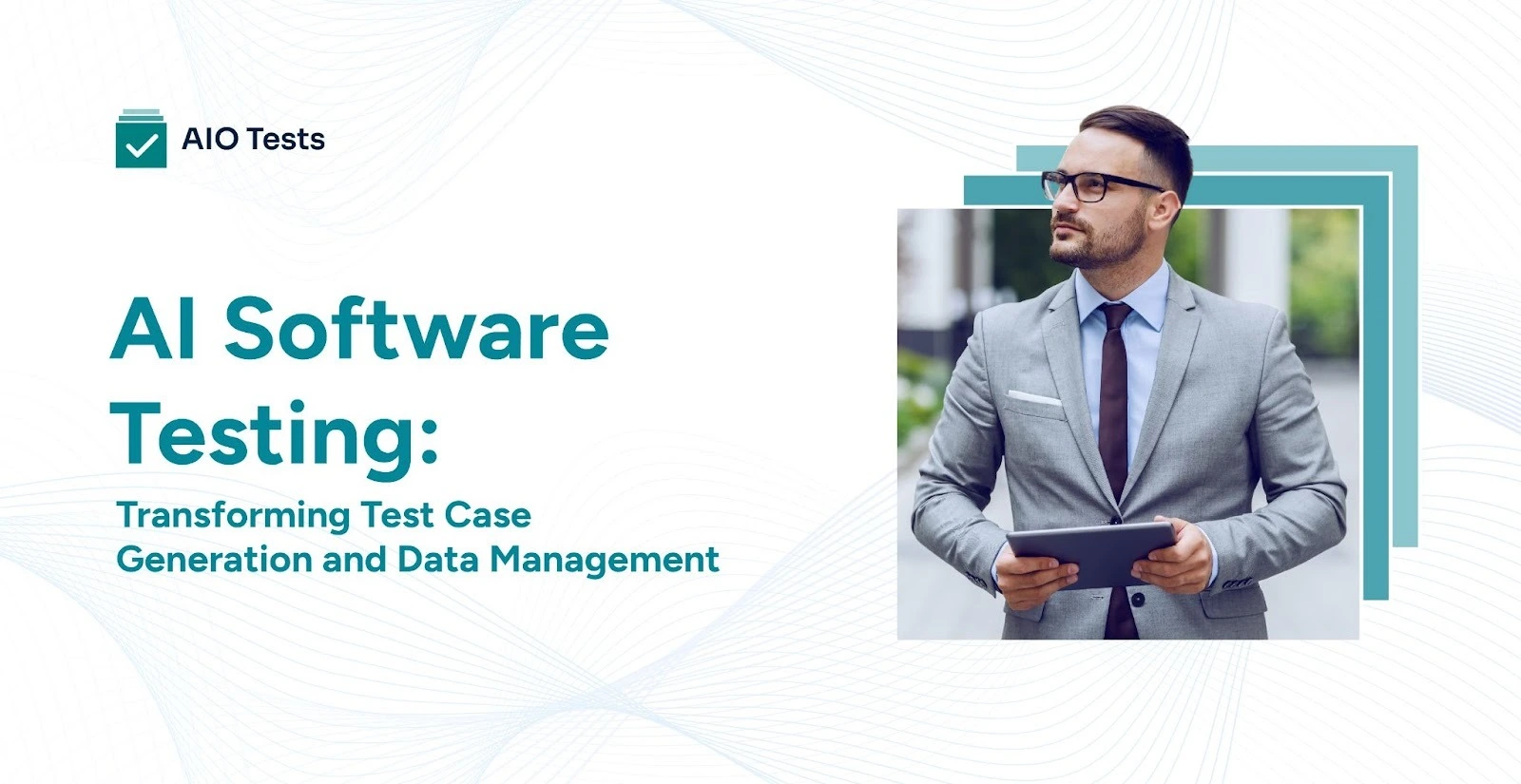Quick Summary
AI in software testing is redefining how QA teams manage test cases and test data. Instead of wasting cycles on rewriting tests and cleaning datasets every release, AI automates creation, learns from patterns, and generates realistic, compliant data, and adapts continuously.
Ask any QA engineer what slows them down most, and you’ll probably hear the same two words: test cases and data.
Writing endless test cases by hand. Hunting for clean, usable test data. Repeating the same steps release after release. It’s work that feels necessary but rarely meaningful.
Now, AI is quietly handling that heavy lifting in the background, with surprising accuracy. It studies past defects, learns from patterns, and helps testers focus on improving software quality assurance rather than chasing processes.
This isn’t hype. It’s a practical change in how QA teams think and work. In this article, we’ll look at how AI software testing enhances both test case generation and test data management, making everyday testing simpler, faster, and more reliable.
Why Is Manual Test Case Generation and Test Data Management Holding QA Back?
Most QA teams know the struggle well. Maintaining and writing test cases by hand takes time, patience, and a lot of repetitive work. Every new feature means another round of documentation, review, and rework. Over time, it becomes less about testing intelligently and more about keeping up with the process.
Manual testing also carries quite a few risks:
- Repetition and bias — people tend to create similar test cases and overlook edge conditions.
- Inconsistency — as projects scale, maintaining structure and relevance across tests gets harder.
- Time drain — industry surveys show that QA engineers spend up to 40% of their time designing and updating test cases instead of executing them.
Then there’s test data management — often the most underestimated part of QA. Teams spend hours searching for valid datasets or sanitizing production data to stay compliant. The result is:
- Missing or outdated data that skews results.
- Limited coverage for real-world scenarios.
- Slow release cycles because tests can’t run without the right inputs.
The truth is, manual effort alone can’t keep up with modern development speeds. This is where the debate of manual vs automated test management becomes crucial.
Many teams are now moving toward AI software testing tools and AI-driven test management systems that use automation and machine learning to reduce redundancy, improve data accuracy, and free testers to focus on actual quality rather than administration.
How AI QA Testing Streamlines and Secures Test Data Management
Creating and maintaining test cases is the most repetitive part of QA work. Every new feature or code change means revisiting old tests, updating steps, and trying not to miss edge cases. It’s slow, manual, and prone to bias.
AI software testing changes this by learning from real user behavior, past defects, and usage data. Through machine learning testing models, it identifies risk areas and patterns that humans might overlook. Instead of starting from scratch, QA teams can generate and refine test cases automatically based on data-driven insights.
Here’s how AI-powered QA tools streamline test creation processes while delivering measurable AI test case generation benefits across accuracy and coverage.
- Automated AI testing adapts to change - When code or user flows evolve, AI updates relevant test cases instead of recreating everything manually.
- Reusable and optimized test cases - The system detects overlaps, removes redundant steps, and ensures coverage across critical paths.
- Smart QA testing reduces redundancy - AI can spot patterns of duplication and suggest merging or simplifying tests for cleaner management.
This means testers spend less time writing and more time analyzing what matters, the overall quality of the product. The shift is about giving them better tools to work with.
Traditional vs. AI-Enhanced Test Case Generation

How Does AI Improve Test Data Management in QA?
Test data often causes more delays than test execution itself. Finding the right data, cleaning it, and keeping it compliant takes time that QA teams rarely have.
AI-powered test management tools solve this by generating and maintaining data that’s both realistic and secure. Using artificial intelligence testing methods, AI systems can understand data relationships, detect gaps, and even predict what information will be needed next.
Here’s how it helps in practical terms:
- Synthesizing realistic, privacy-compliant data. AI tools can create synthetic data that mirrors real production patterns while removing personal identifiers, keeping tests both accurate and compliant.
- Finding gaps and redundancies. Machine learning models analyze datasets to highlight missing values, duplicates, or untested scenarios that might cause coverage issues.
- Predicting future data needs. By tracking past tests and upcoming builds, AI can estimate what data will be required for continuous testing pipelines.
And because most AI-driven test management platforms integrate directly with CI CD in automation workflows, the process becomes truly continuous. Data generation, validation, and refresh happen automatically as new builds roll out.
Modern AI software testing tools like AIO Tests bring all these capabilities into one place, handling large-scale datasets, ensuring consistency, and freeing QA teams from manual setup work.
How Do AI Software Testing Tools Compare — and What Makes AIO Tests Stand Out?
AI software testing tools aren’t all built the same. While most aim to automate parts of QA, their real value lies in how well they handle four core areas: automation, data intelligence, integration, and scalability.
Here’s a simple way to compare them:
- Automation capability: Look for tools that go beyond basic scripting. The best options use machine learning to analyze code changes and automatically generate or refine test cases.
- Data management intelligence: Strong tools offer built-in AI that understands data relationships, identifies gaps, and creates realistic, compliant test data for multiple environments.
- Integration flexibility: Modern QA doesn’t exist in isolation. Seamless integration with platforms like Jira, Jenkins, and CI/CD pipelines ensures continuous testing without constant manual setup.
- Scalability and analytics: Teams need visibility at every stage. Good AI QA tools provide insights on coverage, risk, and performance trends as projects grow.
Platforms like AIO Tests combine all these capabilities into a unified AI QA ecosystem. Its Generative AI features assist with intelligent test case creation, dynamic data management, and language-aware improvements.

1. Automated Test Case Creation That Fits Your Workflow
- The AI-Assisted Case Creation feature uses generative AI to automatically generate relevant test cases and link them to Jira requirements.
- You can choose between classic or BDD-style cases, so both development and QA teams stay aligned.
- Customisable templates let you define end-to-end, positive- or negative-case flows with minimal manual effort.
- Multi-language support, grammar correction, and translations are baked in, so non-English teams are covered too. In short, rather than writing every test case from scratch or importing messy spreadsheets, your team can benefit from AI-driven creation and reuse.
2. Seamless Integration with Jira, CI/CD & Automation Frameworks
- AIO Tests sits directly inside Jira, so you don’t have to juggle multiple tools just to track traceability from requirements → test cases → defects.
- Automation hooks: via REST APIs, Jenkins plugin, support for TestNG, JUnit, Cucumber, Cypress, etc. That means your automated test runs, execution results, and defects all feed into one ecosystem. No disconnected silos.
3. Robust Reporting, Traceability & Visibility
- AIO Tests offers 20+ built-in report types, covering test coverage, execution status, automation results, and defect trends.
- Dashboard gadgets and scheduleable reports make it easier for stakeholders to get updates they can trust. Version control, linked cases, and a full history of changes make auditing and scaling easier.
4. Scalability, Customisation & Long-Term Use
- You can import existing test cases (Excel, CSV, .feature files) easily, which means migrating from legacy systems is smoother.
- Custom fields, configurable workflows, folder structures, and permission controls let you adapt the tool to your team, not the other way around.
- The platform is used in 100+ countries, with 4,200+ customers and 200,000+ active users, so it's built for teams beyond small pilots.
%20(1).webp)
Conclusion
The way we test software has changed. We moved from manual checks to automated scripts, and now we’re entering a phase of intelligent testing powered by AI.
Key takeaways:
- Speed: AI handles repetitive tasks, letting testers focus on complex scenarios.
- Accuracy: Intelligent test generation reduces errors and missed cases.
- Scalability: Teams can run larger test suites without adding manual effort.
AI-driven QA is about making testing more efficient and insightful. And AIO Tests makes this transition smooth, integrating with your workflows and providing clear insights along the way. AI is not replacing testers, it’s empowering them.
Book a Demo with AIO tests and know how the tool can transform your QA workflow.

FAQs
- What challenges does AI solve in modern QA and software testing?
AI addresses issues like repetitive test case writing, inconsistent test data, and slow feedback cycles. By learning from previous test outcomes and production defects, QA teams can improve coverage and release speed.
- How do AI software testing tools differ from automated testing tools?
While traditional automation executes predefined scripts, AI-based tools analyze historical data to create, prioritize, and optimize tests automatically. They continuously adapt to code and requirement changes without manual intervention.
- What industries benefit most from AI-driven QA testing?
AI software testing is widely used in finance, healthcare, e-commerce, and SaaS industries, where large data volumes and compliance demands make accuracy and test efficiency critical.
- How can teams adopt AI-powered QA tools like AIO Tests effectively?
To implement AI QA tools successfully, teams should start by automating areas such as regression testing and integrating the platform with existing CI/CD pipelines. Also use AI insights to refine test planning and defect analysis over time.








.svg)
